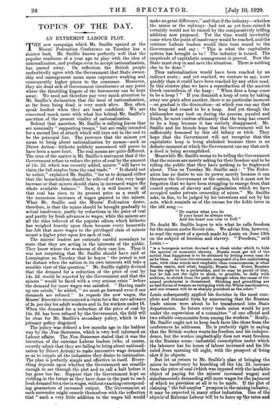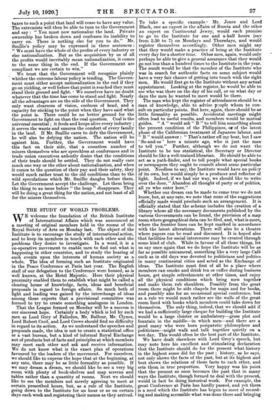TOPICS OF THE DAY.
AN EXTREMIST LABOUR PLOT.
Behind that assertion Mr. Smillie is rallying forces that are nominally "supporting troops," but are really intended for a second line of attack which will turn out in the end to be the principal line. The pretence that the miners yet mean to bring about nationalization by means—such as Direct Action—hitherto publicly announced will prove to have been a mere feint. The real means are quite different. The crux of the matter is Mi. Sniffle's statement that if the Government refuse to reduce the price of coal by the amount of 14s. 2d. which was recently added, miners' will have to claim the full surplus from the coal trade." "It should not be unfair," explained Mr. Smillie, "for us to demand either that the householders should be relieved of this very large increase or that miners should claim in increased wages the whole available balance." Now, it is well known to all that coal has risen to its present price as a result of the numerous increases of wages granted to the miners. What Mr. Smillie and the Miners' Federation desire, therefore, is that the mines should be brought gradually to actual insolvency, partly by reductions in the price of coal and partly by fresh advances in wages, while the miners are all the time relieved of the popular odium which hitherto has weighed heavily upon them because every housewife has felt that more wages to the privileged class of miners meant a higher price upon her sack of coal. The miners' leaders are curiously careful nowadays to state that they are acting in the interests of the public. They know where the weakness of their case lies. Thus it was not surprising that Mr. Smillie should have said at Leamington on Tuesday that he hopes "the period is not far distant when the nation in its own interests will take a sensible view of this question." Mr. Smillie rightly divined that the demand for a reduction of the price of coal by 14s. 2d. would be rejected by the Government and that the miners "would be faced with a very serious crisis" before the demand for more wages was satisfied. "Having made up our minds," he added, "we must go forward even if our demands are refused." As regards the new wages, the Misers' Executive *commend a claim for a flat rate advance of 2s. per day for adult workers and Is. for workers under 16. When the demand for a reduction of the price of coal by 14s. 2d. has been refused by the Government, the field will be clear for Mr. Smillie's secondary policy, which is his primary policy disguised. The policy was defined a few months ago in the baldest way by the New Statesman, which is very well informed on Labour affairs. The New Statesman stated that it was the intention of the extreme Labour leaders (who, of course, secretly admit that they are failing to bring about nationali- zation by Direct Action) to make successive wage demands so as to cripple all the industries they desire to nationalize. The plan is perfectly simple and effective in itself. Every- thing depends upon whether the Government are sensible enough to see through the plot and to call a halt before it has gone too far. Suppose that the Government kept on yielding in the future as they have done in the past to each fresh demand for a rise in wages, without exacting correspond- ing guarantees of increased output. The Government at each surrender might console themselves with the reflection that "such a very little addition to the wages bill would make no great difference," and that if the industry--whether the mines or the railways—had not as yet been ruined it certainly would not be ruined by the comparatively trifling addition now proposed. Yet the time would, inevitably come when the point of insolvency would be reached, and the extreme Labour leaders would then turn round to the Government and say : "This is what the capitalistio system has brought us to ! The industry is ruined. The ineptitude of capitalistic management is proved. Now the State must step in and save the situation. There is nothing else to be done."
Thus nationalization would have been reached by an indirect route ; and yet reached, we venture to say, more quickly than it could have been reached by any other road. In this sinister plan we have a reproduction of the ancient Greek conundrum of the heap : When does a heap cease to be a heap ? " If you diminish a heap of corn by taking away one grain after another, there is no particular moment —so gradual is the diminution—at which you can say that the heap had ceased to be a heap. And yet though the philosopher may look on during the process, puzzled and dumb, he must confess ultimately that the heap has ceased to be a heap because it has entirely disappeared. Mr. Smile and his friends hope that the Government will be sufficiently bemused by this old fallacy or trick. They hope that the Government will not recognize that the capitalistic heap is being abolished because there is no definite moment at which the Government can say that such a deed is beim,. accomplished. Meanwhile fir. Smillie seems to be telling the Government that the miners are merely asking for their freedom and to be telling the public that they have nothing to be frightened about. Thus on Tuesday Mr. Smillie said : "The Feder- ation has no desire to use its power merely because it can threaten the Government or the nation, but it must not be forgotten that we have been struggling to emerge from that cursed system of slavery and degradation which we have occupied under private ownership of mines." Mr. Smillie asks, in fine, to be judged by his intentions and not by his acts, which reminds us of the excuse for the fickle lover in the old song
No matter what you do If your heart be always true,
And his heart was true to Poll."
No doubt Mr. Smillie hopes to win what he calls freedom for the miners under Soviet rule. We advise him, however, to read the report of a speech made by Lenin on June 13th on the subject of freedom and slavery. "Freedom," said Lenin is a bourgeois notion devised as a cloak under which to hide the spectre of economic slavery. Russia must get rid of the notion that happiness is to be attained by letting every man do as he likes. An iron Government, composed of a few unshrinking men, with clear minds and emphatic class consciousness, is what Russia wants, and what, happily, Russia has. Every Russian has the right to be a proletarian, and he may be proud of that, but he has not the right to shirk, to grumble, to daily with sedition, to shrink from the path of danger when the cause of the armed proletariat is threatened. Shirking and grumbling are as bad forms of treason as intriguing with the White reactionaries, and one treason will be as sharply punished as the other."
Lenin subsequently applied his doctrine in the most com- plete and dramatic form by announcing that the Russian trade unions were about to be transformed into State departments. In future every trade union would be put undei the supervision of a committee "of one official and two reliable communists from among the workers." Really, Mr. Smillie ought not to keep back facts like these from the conferences he addresses. He is perfectly right in saying that the British worker wants his freedom and his indepen- dence, but the worker emphaticolly does not want freedom in the Russian sense—industrial conscription under which the labourer has his hours of labour increased and his life ruled from morning till night, with the prospect of being shot if he objects. But let us return to Mr. Smillie's plan of bringing the mines to insolvency by knocking off the 14s. 2d. increase from the price of coal (which was imposed with the laudable object of paying for the miners' increased wages) and simultaneously demanding still more wages for the payment of which no provision at all is to be made. If the plot of claiming" the full surplus "prospers in the mining industry, it may be expected in many other industries. One of the objects'of Extreme Labour will be to force up the rates and taxes to such a point that land will cease to have any value. The extremists will then be able to turn to the Government and say : "You must now nationalize the land. Private ownership has broken down and confesses its inability to carry on. There is nothing else for you to do." Mr. Smillie's policy may be expressed in three sentences : "We must have the whole of the profits of every industry or else nationalization. But as the acquisition by us of all the profits would inevitably mean nationalization, it comes to the same thing in the end. If the Government are compliant we are certain to win." We trust that the Government will recognize plainly whither the extreme labour policy is tending. The Govern- ment must either accept nationalization in the end if they go on yielding, or well before that point is reached they must stand their ground and fight. We ourselves have no doubt whatever that the time has come to stand and fight. Nearly all the advantages are on the side of the Government. They only want clearness of vision, coolness of head, and a capacity for sticking to the point when they have said what the point is. There could be no better ground for the Government to fight on than the coal question. Coal is the universal essential ; it feeds and keeps alive every industry ; it serves the wants and ensures the comfort of every family in the land. If Mr. Smillie cares to defy the Government, he will also be defying the nation. The nation will be against him. Further, the Government would have this fact on their side, that a countless number of miners themselves who are speechless at conferences and in trade union executives ardently desire that the conditions of their trade should be settled. They do not really care much one way or the other about nationalization, and when it comes to the question of their pay and their safety, they would much rather trust to the old conditions than to the wild speculations which Mr. Smillie dangles before them. Let the Government accept the challenge. Let them bring the thing to an issue before "the heap" disappears. They will be doing a great thing for the nation, and not least of all for the miners themselves.



































 Previous page
Previous page